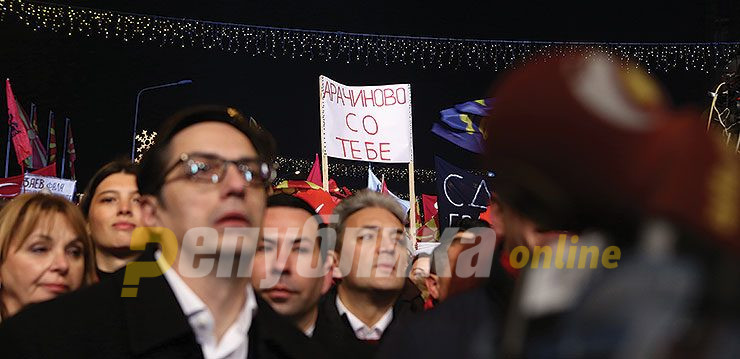While President Pendarovski’s annual address before the Parliament was overshadowed by the protest staged by the opposition VMRO-DPMNE party, one of the points he made is likely to be tested in the coming days. Pendarovski appealed to the ethnic Albanian members of Parliament, and the other non-Macedonian representatives, to support the push to protect Macedonian national identity.
Allow me to add to the same question or to express my position regarding the behavior of the political representatives of our fellow Albanians and their attitude towards the issues that affect the Macedonian identity. Unfortunately, one part of the ethnic Macedonians have had doubts for many years: do Albanian politicians support our struggle for wider international affirmation? I claim responsibly, because I have witnessed these processes for more than 20 years, since we negotiated with Greece in the 1990s, that the Albanian political factor, both when it was in power and in opposition, all these years had extremely correct behavior and understanding of our efforts to preserve and promote the Macedonian identity. Such an attitude helped us be stronger in all meetings with foreign emissaries because we knew that we had a harmonized state position. In fact, it cannot be otherwise because (North) Macedonia is a common house for all of us, in which there is no division of tenants and landlords, Pendarovski said.
The issue could come to the fore, as Pendarovski, and the wider Zaev regime, are under pressure from Bulgaria to accept a more legally binding form to implement the 2017 Zaev – Borisov treaty, through which Bulgaria claims most of Macedonian history and wants to blur the distinction between the two nations. In his remarks, Pendarovski insisted that the Macedonian identity will be protected during these talks, even though both he and Zaev supported prior demands from Greece, similar to those now made by Bulgaria, and engaged in wholesale redefining of the Macedonian history and identity. In this process, nearly all non-Macedonian members of Parliament supported the Zaev regime. All ethnic Albanian members of Parliament voted for the Prespa treaty, insisting that their community demands to to progress toward the European Union, regardless of the price that ethnic Macedonians need to pay for it.
But curiously, some ethnic Albanian politicians have recently voiced concerns about the Bulgarian positions toward Macedonia. Alliance of Albanians party leader Ziadin Sela even warned that the Bulgarian demands imply territorial claims on Macedonia that could destabilize the entire region.





Comments are closed for this post.